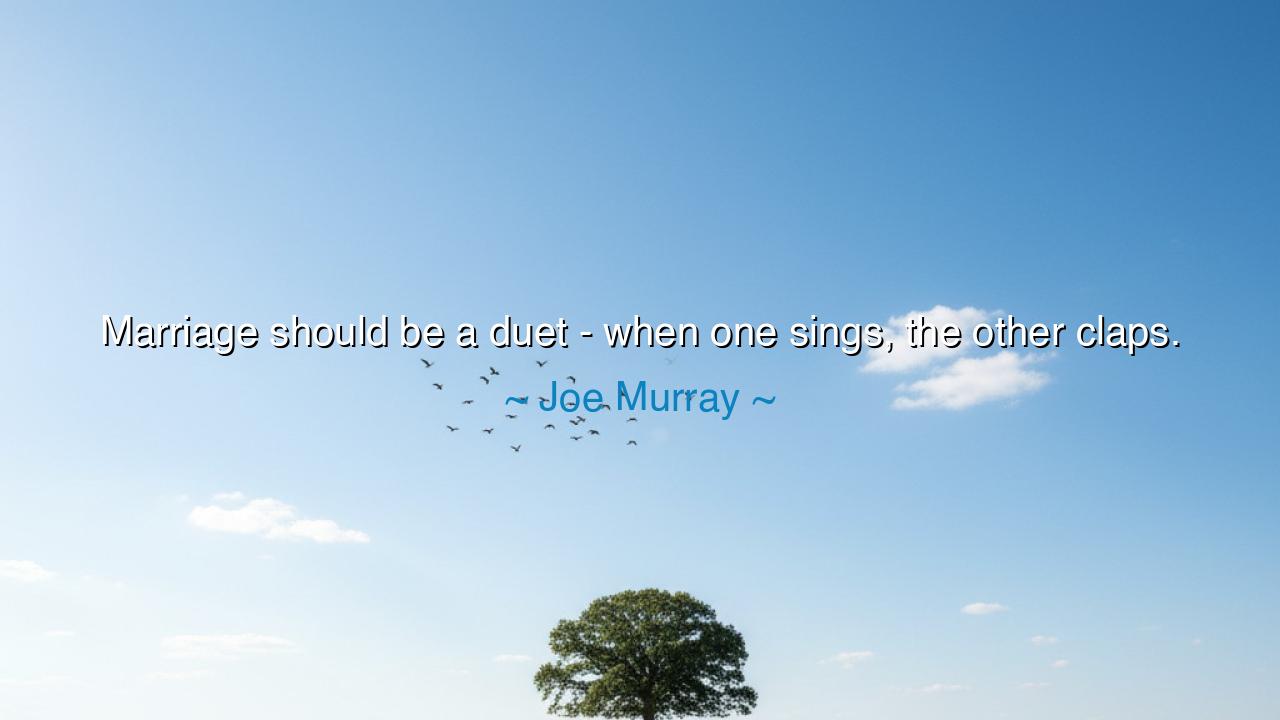
Marriage should be a duet - when one sings, the other claps.






The words of Joe Murray—“Marriage should be a duet – when one sings, the other claps.”—shine with a wisdom both simple and profound. In this metaphor, marriage is not a solo performance, nor a battle of voices, but a harmony of two souls. One may rise to sing, to take the stage of life with strength or passion, while the other supports with joy, encouragement, and affirmation. In this balance of roles, neither is diminished. For when the singer shines, the clapper, too, partakes in the glory. Marriage, Murray teaches, is not about competition, but about complement, not rivalry, but rhythm.
In the ancient world, harmony was seen as the highest of virtues. The Greeks spoke of symphonia, the blending of different notes into one beautiful sound. Likewise, the duet of marriage is not sameness, but difference united in love. One voice may be strong when the other falters, one hand may clap when the other cannot lift itself, and together, they create a music that neither could achieve alone. This is the sacred rhythm of love: a dance of giving and receiving, a song of mutual support.
History bears witness to marriages that embodied this duet. Consider Franklin and Eleanor Roosevelt. Franklin, struck by polio, could no longer walk with ease, yet his wife Eleanor became his strength, his partner in leadership, clapping with dignity and courage as he carried the burdens of the presidency. Later, when Eleanor’s voice rose to advocate for human rights and global justice, Franklin, though weary with illness, honored her convictions and gave her room to sing. Their marriage was not perfect, but in its duet, the world heard a music that shaped nations.
Yet Murray’s words also carry warning. If in marriage both insist on singing at once, the harmony may be lost to clamor. If both insist on applause without offering it, silence and bitterness creep in. The duet requires humility, the willingness to step back so the other may shine, the grace to find joy not in overshadowing, but in supporting. For in true love, the success of one is the success of both, and the applause of one heart strengthens the voice of the other.
This teaching is not only for marriage but for all partnerships in life. Friendships, families, and communities thrive when we learn to take turns in the duet—when one speaks, the other listens; when one labors, the other encourages; when one falters, the other lifts. The wisdom of clapping is as holy as the courage of singing, for both are needed to sustain the music of human bonds.
The lesson, then, is clear: if you would keep your marriage strong, do not demand always to be the singer. Take joy in clapping, in being the witness, the encourager, the hand that amplifies the other’s song. And when it is your turn to sing, do so with gratitude, knowing that love sustains you in every note. This is the rhythm that keeps marriages from breaking under envy or pride.
Practical wisdom flows from this: in your daily life, practice encouragement. When your beloved achieves, celebrate them without reserve. When they falter, be the hands that lift, the applause that reminds them they are not alone. And when your time comes to sing, welcome their support with humility. For the duet is only beautiful when each plays their part with love.
Thus, let Murray’s words echo through generations: marriage is a duet, not a duel. It is a song sung not by one, but by two, where each takes joy in the other’s moment of glory. When one sings, let the other clap, and in this rhythm of giving and receiving, the music of love shall endure, unbroken, eternal.






AAdministratorAdministrator
Welcome, honored guests. Please leave a comment, we will respond soon